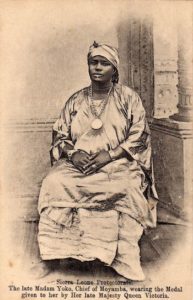
Madam Yoko
*This date in 1849 is celebrated as the birth date of Madame Yoko. Madam Yoko, or Mammy Yoko, was a leader of the Mende people in Sierra Leone.
Madam Yoko, originally called Soma, was born in the Gbo Chiefdom. She changed her name to Yoko at her Sande initiation ceremony, during which she became known for her graceful dancing. Yoko's first marriage was unsuccessful to a man named Gongoima. After leaving Gongoima, Yoko's second husband was Gbenjei, Chief of Taiama. Although Yoko remained childless, Gbenjei made her his great wife, giving her economic power within her household. Following Gbenjei's death, Yoko married Gbanya Lango.
In 1875, Gbanya was detained by British colonial officials in Taiamawaro. Yoko went directly to Governor Rowe to appeal for her husband's release. Rowe was impressed with Yoko's appeal, and Gbanya was flogged and released. Following this incident, Gbanya made Yoko his great wife and sent her on diplomatic missions. With the Sande, Yoko could wield significant power amongst women and Mende society as a whole. She made political alliances as a leader in this women's secret society. She took younger initiates as "wards," later marrying them into other aristocratic lineages to imitate her rise to power trajectory.
In 1878, following her third husband's death, Yoko became the chief of Senehun. By 1884 she was officially recognized as "Queen of Senehun." This recognition came not only from her people but also from the British. Combining advantageous lineage, shrewd marriage choices, and the power the secret Sande society afforded her, Yoko became a leader of considerable influence. She expanded the Mende Kingdom and was the ruler of the vast Kpa Mende Confederacy at the time of her death. Madam Yoko died in 1906, rumored to have committed suicide. Having no descendants, she was succeeded by her brother Lamboi.